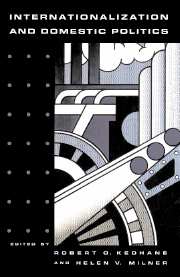Book contents
- Frontmatter
- Contents
- Preface
- Contributors
- PART I Theoretical Framework
- 1 Internationalization and Domestic Politics: An Introduction
- 2 The Impact of the International Economy on National Policies: An Analytical Overview
- 3 Internationalization, Institutions, and Political Change
- PART II The Industrialized Democracies
- PART III Internationalization and Socialism
- PART IV International Economic Crisis and Developing Countries
- PART V Conclusion
- Notes
- References
- Index
1 - Internationalization and Domestic Politics: An Introduction
Published online by Cambridge University Press: 20 March 2010
- Frontmatter
- Contents
- Preface
- Contributors
- PART I Theoretical Framework
- 1 Internationalization and Domestic Politics: An Introduction
- 2 The Impact of the International Economy on National Policies: An Analytical Overview
- 3 Internationalization, Institutions, and Political Change
- PART II The Industrialized Democracies
- PART III Internationalization and Socialism
- PART IV International Economic Crisis and Developing Countries
- PART V Conclusion
- Notes
- References
- Index
Summary
Rapid increases in international economic exchanges during the past four decades have made national economies very open, by historical standards, to the world economy. Much recent economic analysis has been devoted to exploring the effects of such internationalization on macroeconomic policy options, national competitiveness, and rewards to various factors of production. Since economics and politics are so closely linked, there is reason to expect profound political effects as well: in particular, domestic politics in countries around the world should show signs of the impact of the world economy. The central proposition of this volume is that we can no longer understand politics within countries – what we still conventionally call “domestic” politics – without comprehending the nature of the linkages between national economies and the world economy, and changes in such linkages.
“Internationalization” is a broad concept used by a variety of writers in a variety of ways. In Chapter 2, Jeffry Frieden and Ronald Rogowski attempt to introduce some precision into its analysis by distinguishing between observable flows of goods, services, and capital, on the one hand, and the “exogenous easing of international exchange that such flows reflect,” on the other. Measurable flows, such as the vast increases in international capital movements over the past few decades, reflect more basic shifts in the costs of international relative to domestic transactions. Indeed, shifting opportunity costs are more fundamental than the flows themselves: the potential for international movements of capital, in response to shifts in interest rates or changing expectations about exchange rates, can exert profound effects on national economic conditions and policies even if no capital movement actually takes place.
- Type
- Chapter
- Information
- Internationalization and Domestic Politics , pp. 3 - 24Publisher: Cambridge University PressPrint publication year: 1996
- 60
- Cited by



